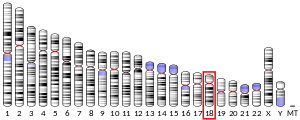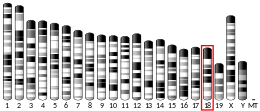Dymeclin is a protein that in humans is encoded by the DYM gene.[5]
This gene encodes a protein which is necessary for normal skeletal development and brain function and has been first described and named in 2003.[6] Mutations in this gene are associated with two types of recessive osteochondrodysplasias, Dyggve-Melchior-Clausen (DMC) syndrome, which involves both skeletal defects and postnatal microcephaly with intellectual deficiency, and Smith-McCort (SMC) dysplasia, which involves skeletal defects only.[5]
References
edit- ^ a b c GRCh38: Ensembl release 89: ENSG00000141627 – Ensembl, May 2017
- ^ a b c GRCm38: Ensembl release 89: ENSMUSG00000035765 – Ensembl, May 2017
- ^ "Human PubMed Reference:". National Center for Biotechnology Information, U.S. National Library of Medicine.
- ^ "Mouse PubMed Reference:". National Center for Biotechnology Information, U.S. National Library of Medicine.
- ^ a b "Entrez Gene: DYM dymeclin".
- ^ El Ghouzzi, V. (2003-02-01). "Mutations in a novel gene Dymeclin (FLJ20071) are responsible for Dyggve-Melchior-Clausen syndrome". Human Molecular Genetics. 12 (3). Oxford University Press (OUP): 357–364. doi:10.1093/hmg/ddg029. ISSN 1460-2083. PMID 12554689.
Further reading
edit- Maruyama K, Sugano S (1994). "Oligo-capping: a simple method to replace the cap structure of eukaryotic mRNAs with oligoribonucleotides". Gene. 138 (1–2): 171–4. doi:10.1016/0378-1119(94)90802-8. PMID 8125298.
- Suzuki Y, Yoshitomo-Nakagawa K, Maruyama K, et al. (1997). "Construction and characterization of a full length-enriched and a 5'-end-enriched cDNA library". Gene. 200 (1–2): 149–56. doi:10.1016/S0378-1119(97)00411-3. PMID 9373149.
- Ehtesham N, Cantor RM, King LM, et al. (2002). "Evidence that Smith-McCort dysplasia and Dyggve-Melchior-Clausen dysplasia are allelic disorders that result from mutations in a gene on chromosome 18q12". Am. J. Hum. Genet. 71 (4): 947–51. doi:10.1086/342669. PMC 378548. PMID 12161821.
- Thauvin-Robinet C, El Ghouzzi V, Chemaitilly W, et al. (2002). "Homozygosity mapping of a Dyggve-Melchior-Clausen syndrome gene to chromosome 18q21.1". J. Med. Genet. 39 (10): 714–7. doi:10.1136/jmg.39.10.714. PMC 1734996. PMID 12362026.
- Strausberg RL, Feingold EA, Grouse LH, et al. (2003). "Generation and initial analysis of more than 15,000 full-length human and mouse cDNA sequences". Proc. Natl. Acad. Sci. U.S.A. 99 (26): 16899–903. Bibcode:2002PNAS...9916899M. doi:10.1073/pnas.242603899. PMC 139241. PMID 12477932.
- Cohn DH, Ehtesham N, Krakow D, et al. (2003). "Mental retardation and abnormal skeletal development (Dyggve-Melchior-Clausen dysplasia) due to mutations in a novel, evolutionarily conserved gene". Am. J. Hum. Genet. 72 (2): 419–28. doi:10.1086/346176. PMC 420018. PMID 12491225.
- El Ghouzzi V, Dagoneau N, Kinning E, et al. (2003). "Mutations in a novel gene Dymeclin (FLJ20071) are responsible for Dyggve-Melchior-Clausen syndrome". Hum. Mol. Genet. 12 (3): 357–64. doi:10.1093/hmg/ddg029. PMID 12554689.
- Ota T, Suzuki Y, Nishikawa T, et al. (2004). "Complete sequencing and characterization of 21,243 full-length human cDNAs". Nat. Genet. 36 (1): 40–5. doi:10.1038/ng1285. PMID 14702039.
- Gerhard DS, Wagner L, Feingold EA, et al. (2004). "The status, quality, and expansion of the NIH full-length cDNA project: the Mammalian Gene Collection (MGC)". Genome Res. 14 (10B): 2121–7. doi:10.1101/gr.2596504. PMC 528928. PMID 15489334.
- Clark TA, Schweitzer AC, Chen TX, et al. (2007). "Discovery of tissue-specific exons using comprehensive human exon microarrays". Genome Biol. 8 (4): R64. doi:10.1186/gb-2007-8-4-r64. PMC 1896007. PMID 17456239.



